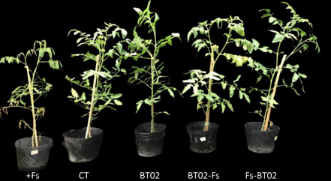BIOCONTROL POTENTIAL OF ENDOPHYTIC Aspergillus spp. AGAINST Fusarium verticillioides
Fusarium verticillioides is the causal agent of ear, stalk and root rot of maize that results in the severe reduction in yields and quality of infected products. Endophytic fungi have been purported as potential candidates in controlling pathogens since they are considered strong plant mutualists that confer disease resilience to their host. The present study was carried out to determine the in vitro antagonistic activity and biocontrol potential of endophytic Aspergillus spp. associated with P. amboinicus leaves against F. verticillioides. Three fungal endophytes from the genus Aspergillus were isolated and identified from the leaves of P. amboinicus, namely A. flavus, A. terreus and A. niger. The fungal isolates were tested for antagonism against F. verticillioides in dual culture plates. Results indicate that the Aspergillus endophytes can restrict growth of F. verticillioides and employ varying mechanisms of antagonism. A. niger inhibited F. verticillioides by 47.37%, followed by A. flavus (41.02%) and A. terreus (27.91%) respectively. Observations of dual culture plates revealed that A. flavus and A. niger antagonized the pathogen via overgrowth mechanism while A. terreus employed antibiosis to restrict the growth of F. verticillioides. The varying degrees of antagonism exhibited by the Aspergillus endophytes show their potential as biocontrol agents and source of bioactive compounds
Downloads
Copyright (c) 2020 BIOTROPIA - The Southeast Asian Journal of Tropical Biology

This work is licensed under a Creative Commons Attribution-NonCommercial-NoDerivatives 4.0 International License.
Authors who publish with this journal agree with the following terms:
- Authors retain copyright and grant the journal right of first publication, with the work 1 year after publication simultaneously licensed under a Creative Commons attribution-noncommerical-noderivates 4.0 International License that allows others to share, copy and redistribute the work in any medium or format, but only where the use is for non-commercial purposes and an acknowledgement of the work's authorship and initial publication in this journal is mentioned.
- Authors are able to enter into separate, additional contractual arrangements for the non-exclusive distribution of the journal's published version of the work (e.g., post it to an institutional repository or publish it in a book), with an acknowledgement of its initial publication in this journal.
- Authors are permitted and encouraged to post their work online (e.g., in institutional repositories or on their website) prior to and during the submission process, as it can lead to productive exchanges, as well as earlier and greater citation of published work (See The Effect of Open Access).



